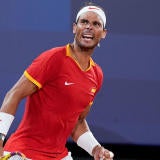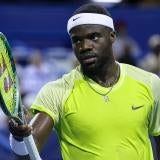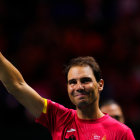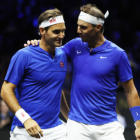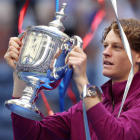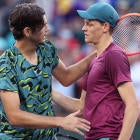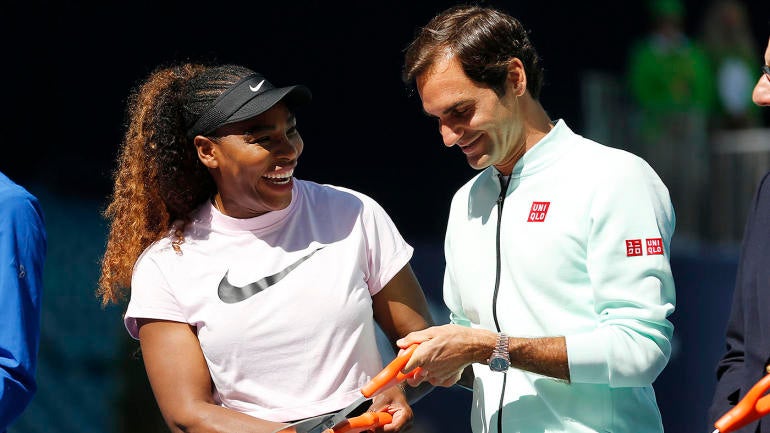
First Serena Williams, now Roger Federer.
What an emotional, unprecedented time for tennis. In a span of three weeks the sport is losing the two players who -- more than anyone else -- defined, then redefined, then redefined again and again, what was possible on grass, clay and hardcourt in the 21st century.
Williams' goodbye came in gutty, prideful, record-setting fashion on Sept. 2 at the US Open. Federer, conversely, will not get a Grand Slam send-off. He announced Thursday that he will retire from professional tennis after one more go of it at London's Laver Cup (which will take place from Sept. 23-25). The Swiss superstar, who'd been playing time against his troubles with injuries in the winter of his phenomenal career, just turned 41. Williams will turn the same age on Sept. 26 -- the day after Federer's final match.
"As many of you know, the past three years have presented me with challenges in the form of injuries and surgeries," Federer wrote. "I've worked hard to return to full competitive form. But I also know my body's capacities and limits, and its message to me lately has been clear. I am 41 years old. I have played more than 1500 matches over 24 years. Tennis has treated me more generously than I ever would have dreamt, and now I must recognize when it is time to end my competitive career."
How much they've given tennis. How much they've given us. There's an easy argument to be made that the sport just lost its two best ever. Certainly its two most captivating players.
Tennis is as physical as it is psychological. Speeds and angles and deceptions and stamina create this concoction that gives tennis the power to drop one's jaw as much if not more than any other sport. Williams and Federer -- masters of recovery, surprise, ingenuity and endurance -- did this to us more often than all others.
Williams brought style, athleticism and aggressiveness to women's tennis on levels it had never seen before. She overpowered opponents. For many spurts of her two-decade career, she was quite literally unbeatable.
Federer's career arc wasn't like that; it's fascinating because of how many different chapters it had.
Yes, there was an epoch where he was, like Serena, literally unbeatable. But he wasn't heralded like Williams was when he came on the scene in the late '90s. He grew into his reign of dominance, then along came Rafael Nadal to play the foil. Soon after that, Novak Djokovic crashed the party and gave tennis its most compelling three-man rivalry ever.
Federer had doubters, even after he'd surpassed Pete Sampras' previous record of 14 Grand Slams. A dozen years ago, on the precipice of turning 30, some believed his days of winning major championships were done. Then he came back, got to No. 1 in his mid-to-late 30s, won a few more major championships and staked his claim to being the greatest there ever was.
With 20 Grand Slams to his name (eight at Wimbledon, six at the Australian Open, five US Opens and one French Open), Federer leaves tennis third all-time in majors for men, behind Nadal (22) and Djokovic (21). But even if he will finish behind his two rivals, it's nearly impossible to argue he'll ever be below them.
Federer's legacy in tennis and his constant presence as a supreme ambassador for the sport is sure to have him remembered my millions as the best player ever. Whereas Serena was a force of nature, Federer was a wizard who preferred racket over wand. He could do almost anything on a tennis court and was chameleon-like in his ability to shift in how he beat his opponents. For as maddening as he must have been to play against, he was just as bewitching to watch. Federer possessed a signature one-handed backhand that sliced with devastating precision and redefined the geometry of the game. He had every trick in the bag and could go entire tournaments without taking a few of them out for show. The most complete player.
This story could have gone another way. An overlooked part of Federer's ascent to world dominance was his brash early days, when he channeled some of tennis' less desirable traits. Verbal sparring matches with judges and immature behavior led to erratic results. He was able to mature out of that phase, and once he did, Federer found something ethereal in his game.
His run of winning 11 out of 16 majors between 2004 and 2007 is a blaze of dominance we'll never see again. He won 94% of his matches in that four-year span. He went more than four straight years ranked as No. 1, a men's record. He finishes with 103 ATP singles titles and another 28 ATP Masters titles. He won 1,251 matches on the ATP tour, an 82% clip.
Outrageous.
It's been more than a year since Federer's last scene in a Grand Slam, Wimbledon in 2021. He lost in the quarterfinals to Hubert Hurkacz. So beloved was he, Brits, Americans, Australians, tennis fans the world over adopted him as their own. But the boy from Basel, Switzerland, has always been proud of his heritage and home country.
Tennis is more popular in many other parts of the world than in the United States, where it's still considered a niche sport nationally. Tennis' current global popularity is owed in overwhelming debt to the way Williams and Federer played over the past 20 years. The grace, gumption and fortitude in how they won. A lad from Basel and a queen from Compton, California, helped grow the game in ways that make impossible to envision the sport without them.
Federer's quick smile, humility and easygoing demeanor made a haughty sport more likable. Williams' trailblazing and uncompromising approach to competition and her personal image forced a predominantly white sport to come to grips with its faults. No one could have known it then, but when Federer and Williams won Wimbledon in 2003 (Federer's first Slam, Williams' sixth at the time), the sport was officially on its way to never being the same again.
For two decades they rallied tennis into a new era -- a much better one than before.
The impressions they left in the grass, the strokes they carved in the clay and the streaks they skidded on the hardcourt are forever indelible. Tennis will not see a pair of supernovas ascend side by side like Serena and Roger ever again.





